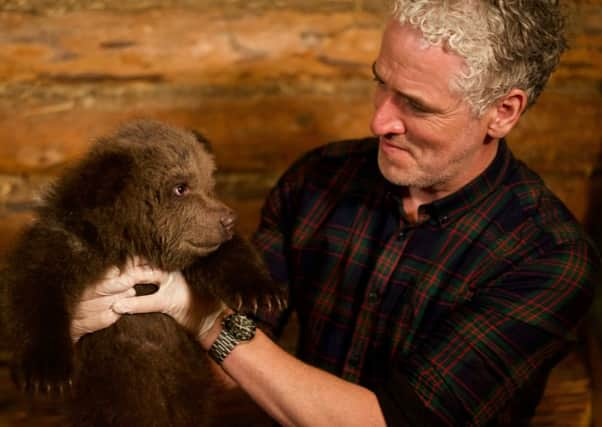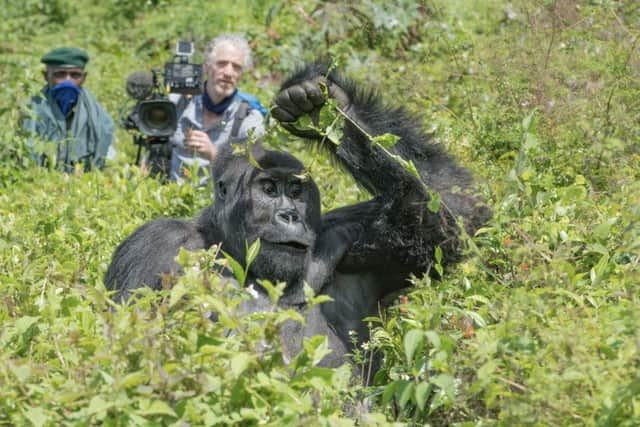Gordon Buchanan on the wonder of wildlife and why he’s more scared of humans than animals


It’s also brought him in close proximity to some of the world’s most fearsome and majestic animals. Sometimes perhaps too close for his liking – footage of a hungry polar bear trying to prise open the doors of his ‘‘bear-proof’’ hide is wildlife documentary filmmaking at its most astonishing and visceral.
Throughout it all, he somehow manages to remain calm, though he later described the experience as “terrifying”.
Advertisement
Hide AdAdvertisement
Hide Ad

Buchanan has become one of our best known wildlife experts on TV over the past decade and a half and his close brush with a female polar bear is just one of many wild encounters he’s experienced during a career spanning nearly 30 years.
Next week he embarks on a UK tour with his one-man show –Animal Families and Me, that comes to Leeds Town Hall and York’s Royal Opera House – in which he’ll be talking about some of these encounters. “My job can be quite solitary and this is an opportunity to talk to people with a shared passion, who watch wildlife documentaries and care about the environment,” he says.
Buchanan was raised on the Isle of Mull in western Scotland which, perhaps not surprisingly given such a glorious backdrop, fuelled his fascination with nature. “Growing up in one of the wildest parts of the UK you’re surrounded by wildlife. I didn’t really appreciate back then how lucky I was, but I was always interested in wildlife,” he says.
Advertisement
Hide AdAdvertisement
Hide Ad“Most of my childhood was spent outside whether it was walking along the shores and doing things that kids used to do, like playing around in rock pools and climbing hills. I was immersed in wild places but I didn’t walk around with a camera and I didn’t have a pair of binoculars or a naturalist’s book, I just loved being in that environment,” he says. “I’m lucky that I’ve found a job that is pretty much a continuation of what I used to do when I was nine or ten years old being out in the wilds watching the world go by.”
It was while working in a local restaurant as a teenager that he stumbled into his future career. “The husband of the woman who owned the restaurant was a wildlife cameraman. I used to love watching wildlife documentaries but didn’t ever think that I could do it. But through working in this restaurant I kept hearing about my boss’s husband and where he was and I thought ‘God, that sounds like an amazing job.’”
He got to know him and after helping out a couple of times was offered a job in West Africa when he was just 17. “The job found me in a way rather than me finding it,” he says.
Advertisement
Hide AdAdvertisement
Hide AdBuchanan has worked as a wildlife cameraman ever since, though it was only through hapenstance while working on a film about leopards in Sri Lanka that he became a presenter. “The producer said if we didn’t get enough leopard footage we’d have to make up the extra screen time and he asked if I knew anyone who had an interesting relationship with the leopards, and I said ‘Not really. It’s just me and I’m spending all my time trying to find these leopards and I’m finding it really difficult.’ So he just said to film myself and it started off as a bit of a video diary of me struggling to find leopards in Sri Lanka and that became the documentary.”
It went down well with viewers and BBC bosses who offered him the chance to do more presenting. “I didn’t embrace it straight away because I liked what I was doing and I was happy as a cameraman, it’s just built over the years.”
During his career he has spent time in close proximity to animals such as wolves, bears and gorillas, but it’s not these encounters that tend to leave him frightened. “The moments where I’ve been concerned for my own safety have always been at the hands of people. Human carelessness or recklessness is something that does scare me.
“With animals, as long as you take the time to study that individual and understand what’s going on in its head you can stay perfectly safe, as long as you know what that animal is capable of doing,” he says. “That’s not to say it isn’t intimidating being surrounded by a herd of elephants, and there’s been times I’ve bumped into bears that didn’t know I was there and been chased. But that was when I was younger and perhaps hadn’t done the internal risk assessment I always do now.
Advertisement
Hide AdAdvertisement
Hide Ad“Tracking tigers on foot sounds dangerous and obviously your heart rate does go a little faster when you’re walking through tall grass and know there’s a tiger around. But it’s not as scary as being in the back of a car with someone that’s driving like a maniac.”
There’s also the wider impact humans are having on the environment, something he’s witnessed at close hand during his career. “The level of habitat loss is shocking and how it’s accelerating. But you have to remain positive and hope the tide is turning.
“My view of the future isn’t one of an apocalypse. I think we’ll get to a point that we realise it’s the number one priority for everyone and to make sure we have a planet that is habitable. “
Advertisement
Hide AdAdvertisement
Hide AdHe concedes, though, that the situation may get worse before it gets better. “Human beings are the number one cause of problems in the natural world... If we didn’t exist nature would rapidly repair itself so I think as long as we see it as our responsibility to lessen the impact we have on the natural world, things hopefully will get better.”
And wildlife documentaries, like the ones he makes, have a role to play in raising awareness. “You’re not manipulating people, you’re showing them exactly what is happening in the natural world. Human beings are compassionate animals, a characteristic we share with the great apes and whales and dolphins. So we care about plants, we care about animals and insects and if you hit the right note people respond to that.”
That said, he believes there is a lot we can learn from studying the natural world. “I think there’s growing levels of discontent and anxiety in society, a sense that we’ve become ungrounded.
“Nature grounds us because for all its complexities it’s easy to understand and if you spend time looking and watching nature you see it’s all interlinked and that’s quite calming.
Advertisement
Hide AdAdvertisement
Hide Ad“We’ve lost the sense of where our place in the world is and I think re-engaging with nature is important for all of us. Green spaces are good for us and it doesn’t have to be the wilds of Papua New Guinea it can be a local park, or a canal walk.”
Animal Families and Me with Gordon Buchanan, Leeds Town Hall, Nov 4, and York Grand Opera House Nov 21.